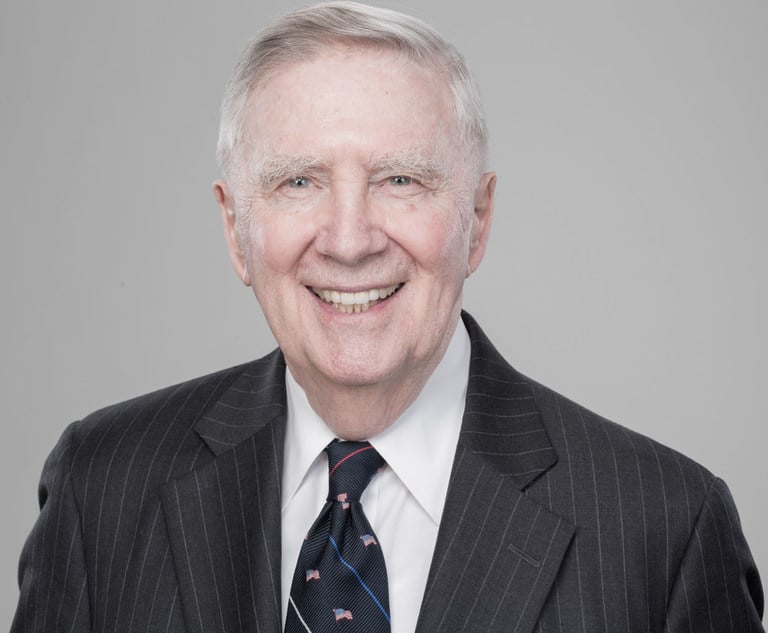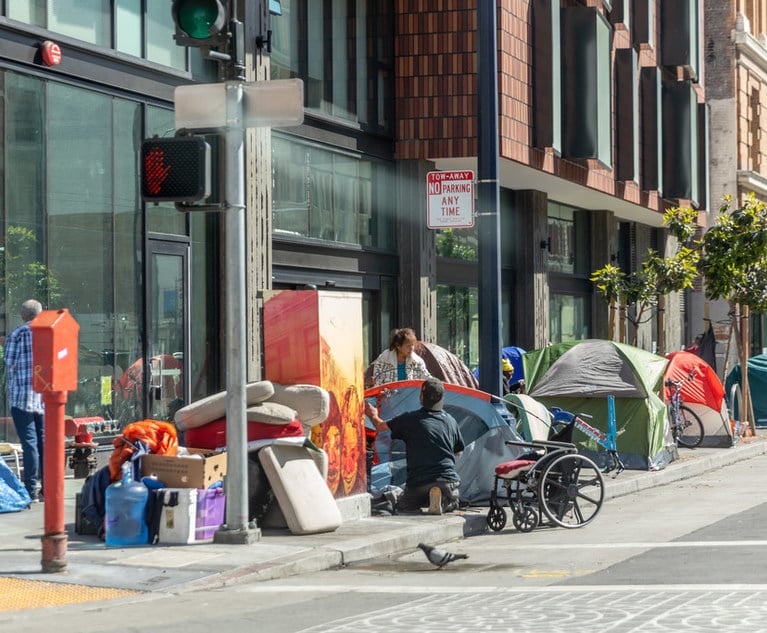Thank you for reading The Marble Palace Blog, which I hope will inform and surprise you about the Supreme Court of the United States. My name is Tony Mauro. I’ve covered the Supreme Court since 1979 and for ALM since 2000. I semiretired in 2019, but I am still fascinated by the high court. I’ll welcome any tips or suggestions for topics to write about. You can reach me at [email protected].
Roy Reardon, a longtime partner at Simpson Thacher & Bartlett, was never a golfer. And he was not an expert on the Americans with Disabilities Act. He was a top-notch litigator and trial lawyer in New York.
But when famed golfer Casey Martin looked to Simpson Thacher to handle his lengthy dispute with the Professional Golfers’ Association, Reardon took it on without hesitation. The PGA had denied Martin the opportunity to play on the PGA tour because he required a golf cart to accommodate his degenerative leg impairment. Reardon won for Martin before the U.S. Court of Appeals for the Ninth Circuit in 2000, and at the U.S. Supreme Court in 2001.
Reardon died on Jan. 7 at the age of 92, leaving a legacy of 61 years at the law firm, mentoring colleagues and representing Fortune 500 companies among many other pursuits. But he may be remembered best for his victory in the Supreme Court case PGA Tour v. Martin.
Reardon undertook the case by happenstance. While on a golf course, Martin chatted with a golfer who happened to be a Simpson Thacher client. He said the firm could rival the “top gun” lawyers representing the PGA. The client contacted Simpson Thacher, and Reardon was suggested as the right person to take Martin’s case. Reardon quickly agreed to represent Martin and got to work, said Joseph McLaughlin, a Simpson Thacher partner who was Reardon’s “second chair” for the case.
“There were no shortcuts in his approach to preparation,” McLaughlin said this week. “He would read every document, every line of the trial record. And then he would highlight and annotate it with his personal commentary.” Reardon’s representation was on a pro bono basis.
Disability law advocates reached out to Reardon, but McLaughlin said none of them tried to elbow Reardon aside and take over the argument themselves. “They were completely supportive and collaborative. Roy’s stature was such that nobody was going to question the selection of lawyers or lead counsel. That was a very nice aspect of it,” McLaughlin said.
The disability advocates did urge Reardon to practice before the argument with a moot court at Georgetown University Law Center. Reardon was reluctant at first, but ultimately agreed. If nothing else, Reardon said at a 2016 oral history interview, the moot court participants gave him good advice.
“One thing that everybody impressed upon me,” Reardon said, “is that I should not become involved in a long argument with Justice Scalia. That was because he would wind up taking your time, number one. And secondly that you wouldn’t win in the discussion with Scalia. He would kill you.”
Scalia, not a golf fan, was indeed tough on Reardon, said Simpson Thacher partner Lynn Neuner, who was part of the team for Reardon’s Supreme Court argument. “Justice Scalia gave him a hard time with an extended hypothetical about accommodations to Little League players at bat,” she said. “Roy did not shy away from the contest. Roy was superb at oral argument.”
McLaughlin recalled, “Casey Martin’s family was sitting with Sens. Bob Dole and Tom Harkin, who were sponsors of the ADA. I was later told that some of the questions that Scalia directed to Roy were difficult for the family to hear.”
Sure enough, in one of several colloquies with Scalia, the justice began, “Mr. Reardon, lest we seem as ignorant of the rules of baseball as we may well be of the rules of golf, and the former would be a much greater sin…” After other jabs, Reardon switched gears and deflected Scalia by saying, “I don’t know if I’ve answered your question, Justice Stevens …”
When the argument ended, Reardon came away doubting he would win: “I said to my wife, ‘I’m going to get one dissent and I’m grateful for it. One solid dissent for the disabled.’”
McLaughlin explained, “Roy was always very hard on himself. He was just one of those people who would never come out, strutting and saying, ‘I just knocked that out of the park.’ That kind of perfectionism goes far to explain how he stayed so good for so long.’”
Reardon fretted during the five months the court took to hand down the decision. On May 29, Reardon received a phone call from the court clerk’s office alerting him that he had won the case for Martin by a 7-2 vote.
Justice John Paul Stevens wrote the majority opinion, with Justices Antonin Scalia and Clarence Thomas dissenting. “Title III of the ADA, by its plain terms, prohibits petitioner from denying Martin equal access to its tours on the basis of his disability,” Stevens wrote.
“It was the most rewarding pro bono effort I had ever made,” Reardon said in the 2016 interview, “and it was a good thing for Casey and for the disabled.”
Veteran Supreme Court practitioner Bartow Farr, who argued in the case on behalf of the PGA and against Martin, said of Reardon this week, “While I certainly remember that the court asked tough questions of both sides in the oral argument, he obviously was able to make his case in a way that persuaded most of the justices, all to his credit and the benefit of Casey Martin. So, from my perspective, he definitely earned a victory to be proud of.”
NOT FOR REPRINT
© 2024 ALM Global, LLC, All Rights Reserved. Request academic re-use from www.copyright.com. All other uses, submit a request to [email protected]. For more information visit Asset & Logo Licensing.


 Roy Reardon, former litigation department head at Simpson Thacher & Bartlett. Courtesy photo
Roy Reardon, former litigation department head at Simpson Thacher & Bartlett. Courtesy photo






